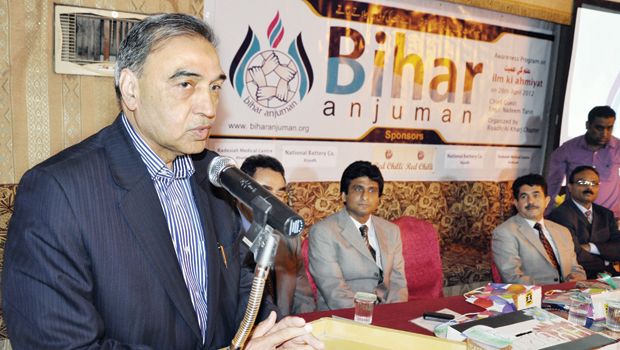
Riyadh, April 29: India Islamic Culture Center (IICC), an apex Islamic center with a mandate to provide a unified platform for promoting Islamic heritage and interfaith harmony, is planning to open regional chapters across India to give greater wingspan to its activities.
“A total of five chapters including one in the eastern Indian state of Bihar have been proposed,” announced Sirajuddin Qureshi, IICC president, in Riyadh Thursday night.
“The IICC will work with Indian government agencies and Saudi organizations including the New Delhi-based Saudi Embassy to generate support for the IICC’s expansion plan and for building its chapters in different provinces of India,” said Qureshi, while speaking at a function organized by welfare organization Bihar Anjuman in the capital. Qureshi arrived here on Thursday on a private visit. Nadeem Tarin, a prominent community leader and businessman, was the chief guest at the event, while Qureshi and Dilnawaz Roomi were the guests of honor.
Indian community leaders including S. Muneer Ahmed, Murshid Kamal, Faizan Balkhi, Jabed Hussain, Ziauddin Ahmed, Seraj Akram, Naushad Alam and Kaunain Shahidi were instrumental in organizing the event. A presentation about the activities of Bihar Anjuman was made by Shakeel Ahmed, the founder.
Qureshi said the state-level chapters would be launched soon. “We have already applied for the land allotments in some states,” said the IICC chief, adding that the IICC had called on the Kingdom's donor agencies and also the affluent NRIs living in Saudi Arabia and other countries to back the efforts to set up new centers.
To this end, he noted the IICC has become a hub of activities and program including seminars, symposiums and roadshows on mostly Muslim issues since its inauguration by Congress President Sonia Gandhi way back in June 2006. Late Prime Minister Indira Gandhi laid the foundation stone of the center in 1984. The IICC chief, who held a luncheon meeting with a group of affluent Indian community members to conceive the idea of IICC chapter in Patna and to formally launch a campaign to generate support for Patna center, said the New Delhi-based main IICC needs more resources to expand its facility.
Qureshi, who is chairman of the world-renowned India-based Hind Group, also called on Indian youth and especially his co-religionists to launch their own business ventures. "Our young generation must venture into the business field," he said.
Qureshi, who wrote his own fate and amassed huge prestige and wealth after starting a small venture on the roadside of the Indian capital several decades back, said business relations between Indian and Saudi Arabia are progressively growing.
He said official visits by leaders of both countries have built on the existing partnership. “In forging strategic ties with Saudi Arabia, India is always at an advantageous position,” said Qureshi, adding the recent visit of Indian Defense Minister A. K. Antony has boosted our defense ties with this nation. Qureshi, who heads a big Indian industry conglomerate with businesses in the slaughtering, processing and export of meat and meat products, fast food chains, infrastructure and aviation sector, has also plans to expand his fast food network.
In the meat industry, he has the most modern state of the art Abattoir-cum-meat processing plant, which is part of the Hind Agro Industries Limited. It was established in the CDF Complex in north Indian city of Aligarh with the world-renowned companies of New Zealand and Australia as technical collaborators.
Bihar Anjuman, which has chapters across the six-nation Gulf Cooperation Council (GCC) and India, is a premier welfare organization dedicated to helping poor Muslims. Qureshi has always been on the forefront in promoting social and charitable organizations like Bihar Anjuman. The foundation for Bihar Anjuman was laid on March 11, 1999, with some people joining hands to help those who may be in need of financial help, or in need of a job.





Comments
whoah this blog is wonderful i like studying your articles.
Stay up the great work! You understand, lots
of persons are searching around for this information,
you could aid them greatly.
my web page :: how to remove man boobs: http://howtolosemanboobsfast.strikingly.com/
Add new comment